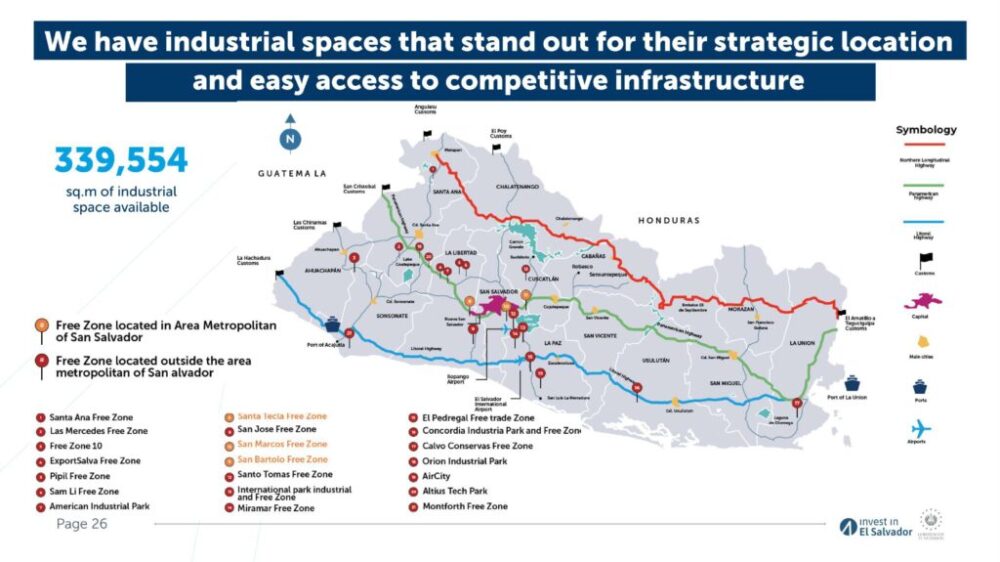
El Salvador’s main businesses
El Salvador, the smallest and most densely populated country in Central America, has a diverse economy that reflects both its rich cultural heritage and adaptation to modern market demands. Major businesses and industries in the country range from traditional sectors like agriculture to newer industries, including manufacturing, services, and technology. Over the past decades, El Salvador has made significant strides in diversifying its economy, fostering a conducive environment for foreign investment, and embracing technology-driven businesses. Here’s a closer look at some of El Salvador’s main business sectors:
1. Agriculture and Agro-Processing
Agriculture has been historically central to El Salvador’s economy, particularly in the production of coffee, sugar, and corn. Coffee production, especially, has been an integral part of El Salvador’s economy since the late 19th century, with Salvadoran coffee being exported around the world for its unique flavor profile. However, declining global coffee prices and competition have led to a reduction in production levels. To address this, the government has encouraged diversification into other cash crops, such as cocoa and tropical fruits, along with investment in agro-processing, which allows for value-added export products. Companies in this sector work not only to supply local markets but also to meet export demands, primarily from the United States and other Central American countries.
2. Manufacturing and Textiles
El Salvador has become a significant player in the textile and apparel manufacturing industry, largely due to trade agreements like the Central America-Dominican Republic Free Trade Agreement (CAFTA-DR) with the United States. Textile manufacturing has proven beneficial due to its labor-intensive nature, creating numerous jobs in the country. Major global brands source apparel from El Salvador’s textile factories, which produce a wide variety of garments ranging from T-shirts to sportswear. The maquila (assembly for export) industry is a major source of foreign income and a strong contributor to El Salvador’s GDP. Additionally, there is a small but growing electronics manufacturing sector focused on components for export markets.
3. Financial Services
El Salvador’s financial sector is well-developed compared to other Central American nations, with a robust banking system that has expanded services in recent years. Several private banks dominate the sector, alongside international banks with a presence in the country, providing a wide range of services from consumer banking to corporate finance. Notably, El Salvador became the first country in the world to adopt Bitcoin as legal tender in 2021, a move intended to boost financial inclusion, attract tech-savvy investors, and facilitate remittances from Salvadorans living abroad. This bold step placed El Salvador on the map as a forward-looking nation in the financial services and digital currency space.
4. Tourism
Tourism is another growing industry in El Salvador, capitalizing on the country’s scenic beaches, historical landmarks, and vibrant cultural heritage. Surf tourism, in particular, is a major draw, as El Salvador boasts some of the best waves in Central America. The Salvadoran government has invested in promoting the country as a tourist destination under initiatives like “Surf City,” aiming to attract both international tourists and investment in tourism infrastructure. The increase in international events and efforts to improve safety have further boosted tourism’s potential to contribute significantly to the economy.
5. Technology and Innovation
El Salvador is increasingly focusing on technology and innovation, especially with the growing global interest in blockchain technology. With the adoption of Bitcoin as legal tender, the government has actively promoted the country as a hub for blockchain and cryptocurrency startups. The “Bitcoin City” initiative, announced in 2021, aims to attract crypto entrepreneurs and investors by providing tax incentives and creating a specialized economic zone focused on technology-driven companies. Although the project is still in its nascent stages, it reflects El Salvador’s ambition to be a technology-driven economy.
6. Renewable Energy
El Salvador has also been expanding its renewable energy sector, harnessing its natural geothermal potential, as well as solar and hydroelectric power sources. Due to its volcanic landscape, El Salvador is one of the largest producers of geothermal energy in Central America, and the government has been encouraging investment in green energy projects to reduce the nation’s reliance on imported fossil fuels. This sector offers significant potential for growth, especially as global demand for clean energy rises.
7. Remittances and Foreign Direct Investment
One of the most significant contributors to El Salvador’s economy is remittances, primarily from Salvadorans living in the United States. Remittances represent approximately 20% of the country’s GDP, providing a vital economic lifeline for many Salvadoran households. Additionally, El Salvador has been successful in attracting foreign direct investment (FDI) due to its dollarized economy, stable trade relations, and pro-business policies. Key investors include U.S.-based companies and regional investors from Central America who see the country as a strategic location for manufacturing and logistics.
Conclusion
El Salvador’s economy is an intriguing mix of traditional sectors and emerging industries. While agriculture, manufacturing, and remittances remain critical, new opportunities in financial services, technology, tourism, and renewable energy are transforming the country’s business landscape. With ongoing efforts to promote innovation and attract foreign investment, El Salvador is positioning itself as a dynamic player in the Central American region, seeking to leverage its strengths to foster sustainable growth and prosperity.



Leave a Reply